inside the media company making hits for the TikTok generation
INDUSTRY NOTES #2: Alice Ma, Co-Founder and CEO of Mad Realities
Good morning and welcome back to as seen on!
Today’s newsletter is the second edition of INDUSTRY NOTES, a series where I interview the most interesting Gen Z founders and operators about the companies they’re building and the industries they’re disrupting.
I may or may not have started this series just so I could interview Alice Ma. What I do know is she was the first person I reached out to. Her company, Mad Realities, which produces and distributes short-form series for social platforms, has quietly become one of the most interesting media companies on the internet. If you’ve binged Michelladonna searching for the best bodega cats in NYC, or watched those viral man-on-the-street Hollywood trivia TikToks, then you know Mad Realities — and you’re probably terminally online.
In this conversation, we talked about the rise of creator-led IP, the difference between YouTube and TikTok stars, what actually makes something go viral in 2025, and why so many of the next generation’s biggest shows won’t come out of Hollywood — they’ll start on your phone.
Let’s talk about it in the comments. Enjoy!
INDUSTRY NOTES is a bimonthly interview series where I sit down with Gen Z founders, creators, and operators to explore the most compelling topics at the intersection of business and culture. Think of it as a snapshot of the group chats that inspire this newsletter — conversations with the smartest young people shaping my views on the industries and ideas I love to write about.
Alice! This conversation has been a long time coming, and so much has changed since we first started planning it. Mad Realities has dropped some incredible shows—one of which recently won a Webby. TikTok got banned, unbanned, and might be banned again, and the media landscape is shifting faster than ever.
So, let’s start at the beginning: many founders our age building in media have these “the internet raised me” origin stories. What’s yours?
This conversation is a long time coming for sure! I’m so excited to be chatting about our journey. It honestly goes way back. I grew up on the cusp of the internet, remembering a time both before and after Facebook. That perspective made it easier for me to anticipate how things would continue to evolve. I also grew up in a post-9/11 media environment, which had a huge impact on how I saw the role of media in shaping culture.
My dad was part of the Tiananmen Square protests, which further reinforced for me how important media is to society. Those experiences, combined with studying Political Economy, Computer Science, and Arabic at UC Berkeley, gave me a strong foundation in understanding the intersection of technology, media, and culture.
I’ve also been behind some viral movements, like ConstitutionDAO, where we raised $53 million in seven days to bid on a copy of the U.S. Constitution at Sotheby’s, and more recently, Shop Cats and Hollywood IQ. My background blends both creative and operational thinking, which helps me navigate different spaces and build at the speed of the internet.
You’re also fluent in a few languages. I feel like that needs mentioning.
Yes! I speak multiple languages. I think learning so many languages (like Mandarin, Japanese, French, Arabic, etc.) feels the same as immersing in a new internet subculture. There are so many different niches created by algorithms today– they remind me of lunch tables at the high school cafeteria. Each one speaks a totally different language, and to identify/launch genuine hits on the internet today, you have to be totally immersed.
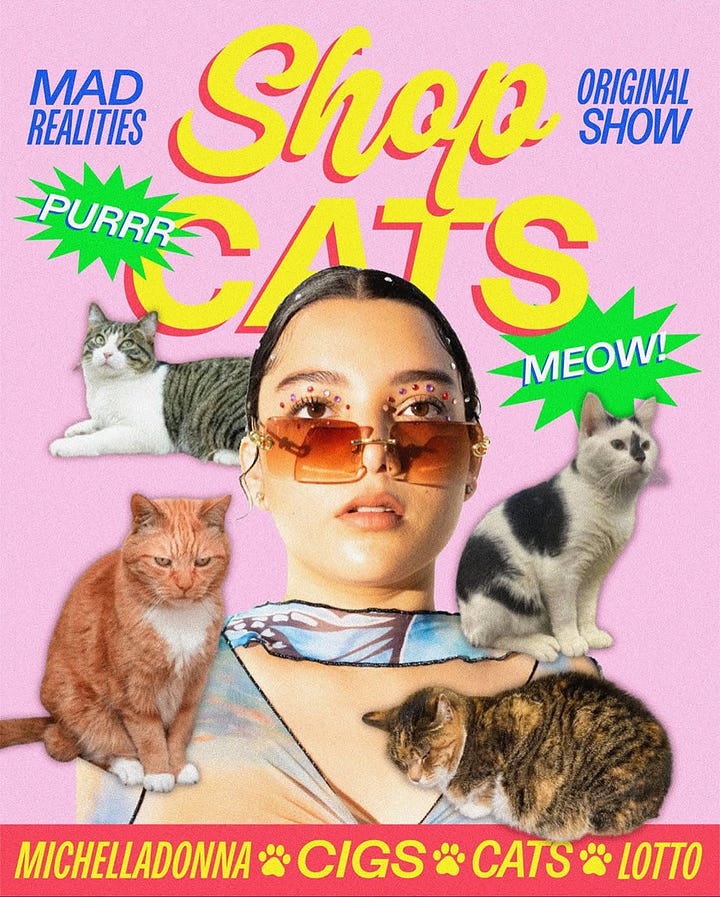
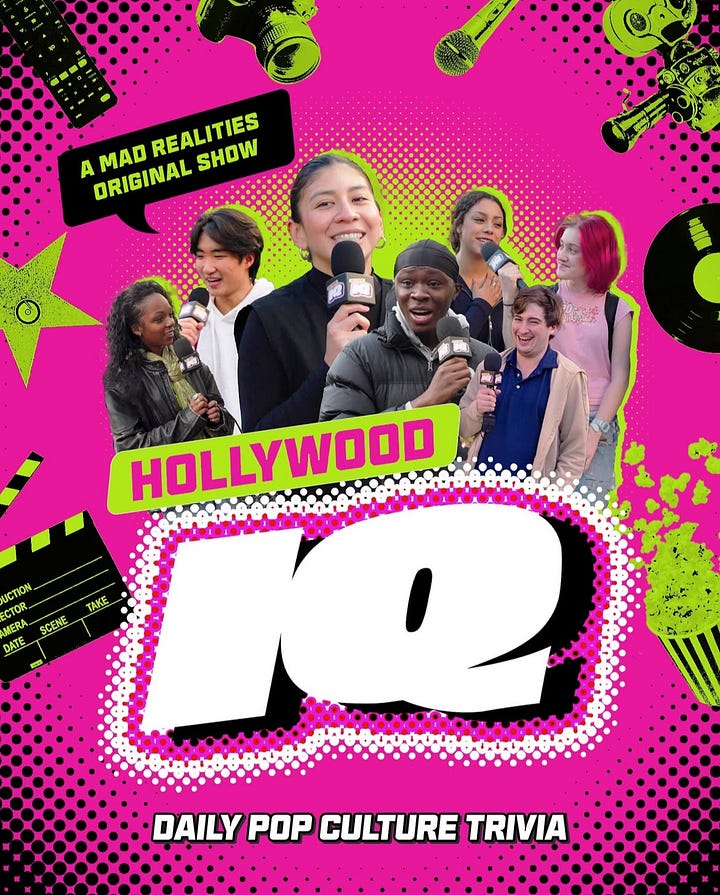
SOCIAL FIRST IP AS THE FUTURE OF HOLLYWOOD
Flash forward to 2025: you’ve positioned Mad Realities as the MTV of our generation, built on the idea that the next generation of successful IP will be social-first, grow massive fandoms, and expand from there. You’ve launched six shows, collaborated with internet stars, minted new ones, and hit over 700M views in four years. Why is this working?
There are a few reasons why this works.
First, thanks to TikTok, Reels, and Shorts, any concept people love can go viral overnight. We’ve had 540M+ views on just Shop Cats and Hollywood IQ since September 2024 — with no paid spend — because we’re making content people actually want to watch.
Second, there’s a gap in the market. A lot of classic formats from the MTV era work incredibly well on social media, but Gen Z isn’t familiar with them. The new generation wants to participate in the content they consume, whether that’s by nominating their local bodega cat or coming on as a contestant for Hollywood IQ. We founded Mad Realities in 2021 to reimagine those formats for a new generation, in a way that invites the world to participate.
Third, we’re uniquely powered by technology on the backend. This lets us move faster in our production process and take a more repeatable, data-driven approach — which brands love when it comes to measuring ROI.
Finally, Hollywood is slow. It takes two or more years to get a traditional show made. There’s no in-between space between being a solo creator and making a traditional TV show — and that’s where we come in. Hollywood was slow to TikTok, just like it was slow to YouTube. And many people in Hollywood still don’t understand the nuances of digital media. They assume YouTube, Instagram, and TikTok stars are all the same — but they’re not. Different people thrive on different platforms.


TIKTOK IS BASICALLY ONE BIG AUDITION
Say more about the TikTok stars vs YouTube stars idea. That’s interesting.
In the YouTube era, almost every successful YouTuber was both in front of the camera and behind it — they had to produce, edit, and structure their own content, often putting out 20-minute videos every week. That meant the best YouTubers were naturally great producers, but it also meant that only great producers could make it big on YouTube long term.
In the TikTok era, many of the biggest stars are just incredible on-camera personalities. They don’t necessarily want to be producers or editors — and that’s where we come in. It’s why we focus on TikTok and Instagram stars over YouTubers. Many TikTok creators are stars on-screen but don’t have the resources, time, or expertise to produce a full show themselves.
So do you think we’re past the YouTube era? I think it's having a renaissance of sorts.
YouTube is having a great moment, and it’s here to stay, but it’s a competitive space. Even Don Lemon is on YouTube now!
I remember you saying during our first conversation, “TikTok is one big audition.” I think a lot of young people today want to be at least semi-famous—though that’s not unique to our generation. There are just more ways to make it happen now. You get a lot of inbound requests from people who want to create shows with you. How are you partnering with these creators, and what’s in it for them?
Gen Z is a totally “camera ready” generation, since we’ve basically all been making videos and trying to go viral since age 11. You can even see this in the kid’s dream careers - nearly ⅓ of kids said they want to be a Youtuber or vlogger as a career in a survey conducted in 2019.
TikTok is basically one big audition. Over 50% of users have posted a video on the platform, and as someone who watches a lot of audition tapes for work, many TikToks are basically a self tape.
You can see this comfortability with the camera by the number of people going out and shooting man on the street videos in Washington Square Park. Yeah, you get rejected a lot, but more often than not people are just down to be on camera and give a little personality.
Back in the 80’s and 90’s, casting directors had to scour the country for willing participants. To break into industry, you had to be well-connected and already “in.” Now with the internet, you can find anyone who wants to be a star by just looking on the internet.
While we’re on the topic of platforms—I’m pretty sure you’re on all the main ones, but correct me if I’m wrong. Is there any nuance to how you approach each one? Especially now, with TikTok’s future in the U.S. feeling so uncertain, how are you thinking about platform strategy?
We use TikTok, Reels, Shorts, and more—basically wherever enables us to reach the most people. TikTok and Instagram Reels are distribution platforms, meaning you can get 1M views overnight if the content is good. When the TikTok ban was impending, we began exploring all other platforms. Because our shows are IPs, they can perform anywhere.
We saw immediate virality with Shop Cats on Red Note, which has been incredible. We’re actually a top Rednote creator now, because it turns out China has and loves shop cats too, and we basically discovered this 1b size audience to distribute to that isn’t anywhere else (TikTok, Instagram, YouTube are all banned in China, ironically enough). Red Note was a great proof of concept that our theory isn’t TikTok-dependent. Our content is adaptable across platforms.
On all other platforms, the show is bilingual in English and Spanish. For Red Note, we added Chinese as well (my cousin does the translations - shoutout Cooper!). It has become a beautiful cultural exchange.
CREATING VIRAL CONTENT AT SCALE
Now let’s talk about your shows—specifically, the creation process. First, what’s the current makeup of the company? And then, what does the concept-to-ideation-to-launch process look like? Is it typically the same for each show?
We have a structured development process. We take the best of the old-school Hollywood development approach. Creators pitch us ideas, and we also generate concepts internally. We then develop the idea in-house, perfecting it, filming a pilot episode, and testing audience reactions before going wide. It’s similar to how Hollywood develops content and test screens movies, or how the old TV pilot season worked, but we operate much quicker.
We’re a lean team, and both Shop Cats and Hollywood IQ were piloted internally before being greenlit. Sometimes a show we thought wouldn’t work goes viral unexpectedly. We create shows we’d personally watch. Our producers are part of the culture and fandoms they create for, making our content authentically passionate and able to resonate with millions.
Shop Cats went viral pretty immediately. It’s since gotten a lot of press from and won a Webby. Another one of your shows, Hollywood IQ, is also doing really well. It’s funny because when I first came across it organically on my TikTok feed a while back, I remember thinking, this looks like a Mad Realities show. I think that says something. What have you learned about internet virality from creating these shows? Is there a formula for engineering viral content?
The key is in simplicity and the concept itself tapping into the zeitgeist. We’ve learned that establishing stakes in the first 5 seconds is key, and that the first 5 seconds can entirely make or break the show. We’ve also learned that incorporating genuine storytelling and emotion is what makes something REALLY a hit. When you push the boundaries and make genuine storytelling social-native, audiences and communities reward that in a big way.
This basically means that making a viral show on social media is both an art and a science.
What DOESN’T work is overly indexing on a creator/host’s follower count. You would think that the greater the follower count, the more viral the content — but actually, when your goal is to break out and go viral in the for you page, we would much rather have a host with a smaller following, star power, and a dedicated community than one with a large but passive following.
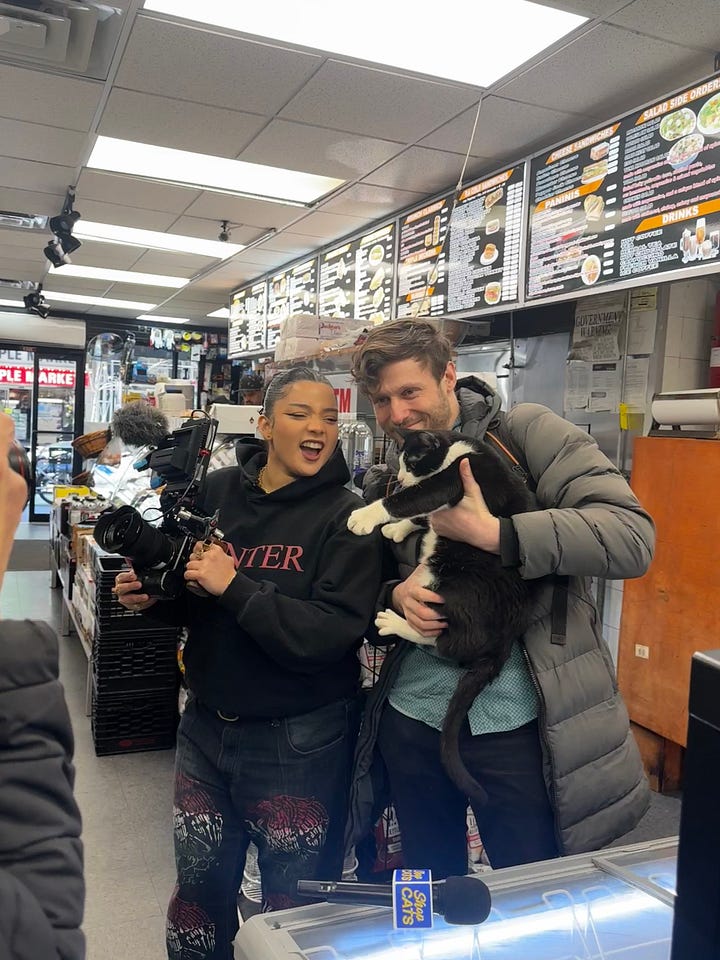
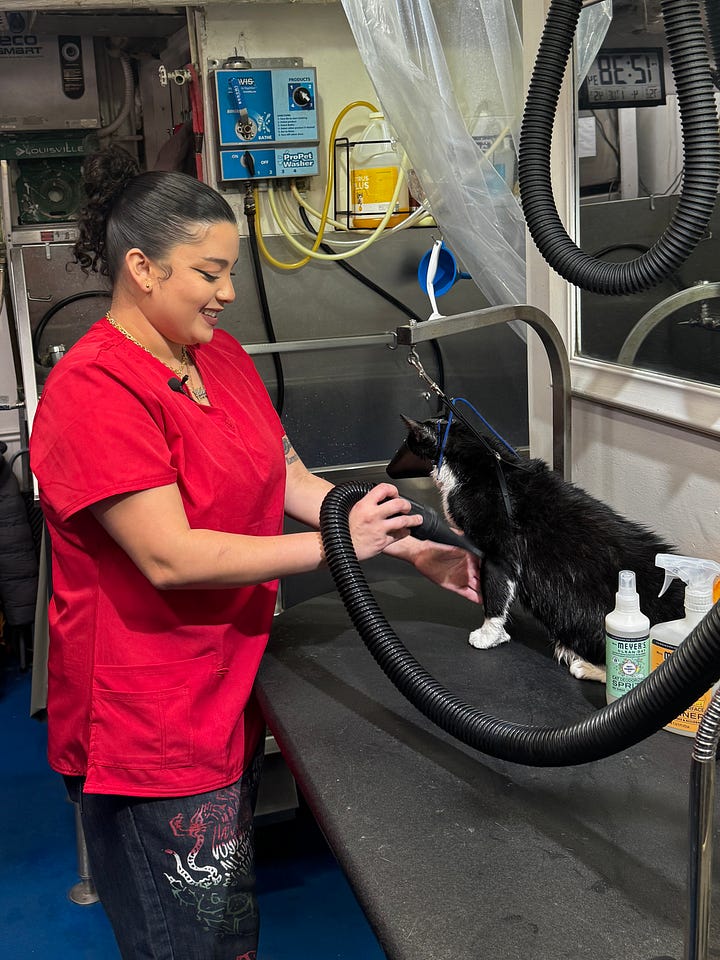
BRING HOLLYWOOD FORMATS TO TIKTOK
I spend a lot of time thinking about Hollywood—traditional media too. I remember reading that the Grammys pulled 15.4 million viewers this year, down about 10% from 2024, but still drove the most social media traffic ever for a TV broadcast. Kind of wild, right? Then there’s SNL, clearly experimenting with a more social-first strategy. To me, all signs point toward a tighter relationship between Hollywood and social. Where do you see shows like yours fitting into that evolving ecosystem?
I think it will be complementary, but the digital industry will eat up many parts of Hollywood in terms of the competition for attention.
There will always be a place for the blockbuster-type Hollywood films and shows. Many of these IPs remain some of the most beloved even in the last few decades: from new breakouts like Oppenheimer and Barbie to Game of Thrones and Succession to Star Wars and Inside Out.
But, as streamers struggle, the landscape for these types of budgets is becoming more limited. The young up-and-coming producer and director that wants to be one of our generation’s greats understands this.
Our POV is that many of the next big IPs will come up socials-first, meaning you can go to market with a concept and validate demand/build out a passionate community with very little startup cost. This means being able to take “multiple shots on goal” in pursuit of a hit - for very little upfront cost, you can take a swing at a whole slate of a dozen show concepts, and double down on what hits.
I picture that eventually many of these IPs make it back onto network TV. It’s similar to Walt Disney’s fly-wheel business model, where he produced an animated movie, which he then aired on his weekly TV show, which then inspired a theme park ride, which he later featured on his TV show, which advertised that theme park ride. People then went to the theme park and bought consumer products, some which inspired more movies and TV shows, starting the entire process all over again. We’re doing that for the 21st century.
Mad Realities signed with CAA a few weeks ago. What will that relationship look like, and how do you see them helping you grow?
We’re working on a lot of projects with CAA. One we’re especially excited about is collaborating with Hollywood production companies to bring their old formats to TikTok. There are so many classic dating, reality, and game shows that are tailor-made for social media. Projects that worked on 2000s and 1990s cable TV will succeed on TikTok — they just need TikTok natives to bring them to life. Mad Realities is the company to do that.
Another focus is taking our IPs and franchising them across books, TV, consumer products, and more.
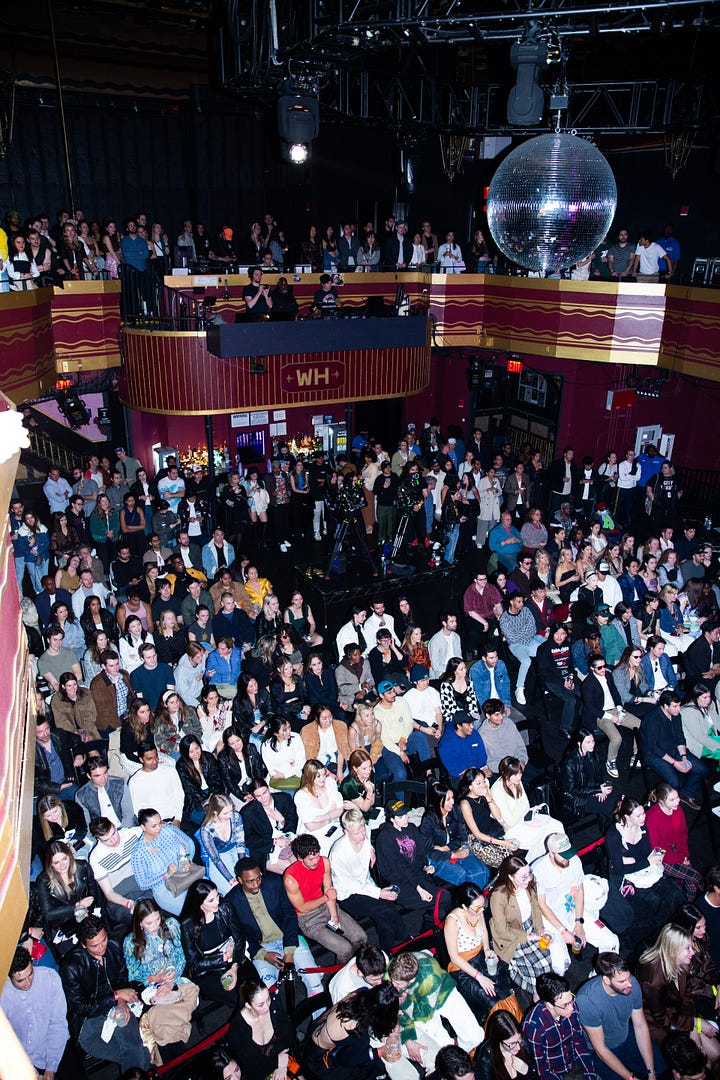
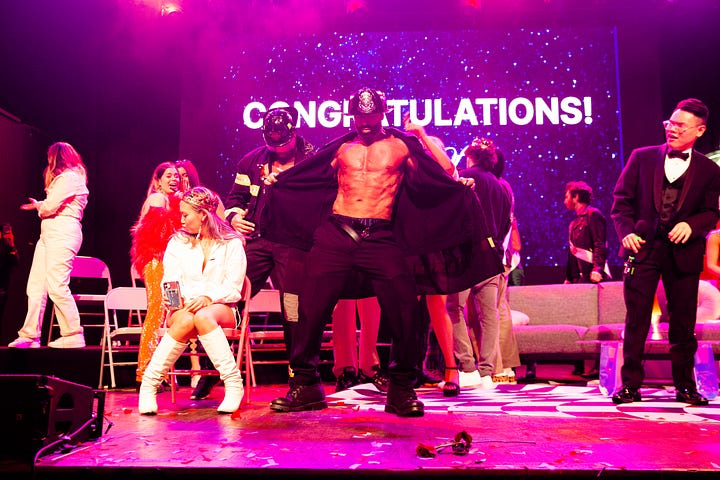
ON BRANDS AS MEDIA COMPANIES
If there’s a third party in this conversation, it’s brands. I’ve been writing about how brands are becoming media companies—some are launching their own social media shows, others are partnering with creators or platforms like yours. Do you see brands becoming serious players in the entertainment space? Could they end up competing with both Hollywood and individual creators?
It certainly makes sense! Consumer brands are becoming more a part of the zeitgeist as well. It can now be cool to partner with a brand - because brands themselves carry so much recognition, and are universally known, which is so rare in the fragmented attention landscape of today. In the 2000s/2010s, working with a brand was invariably seen as an ad and was inauthentic. Today, it is actually just really cool (if it’s the right brand) and can elevate a creator.
Still, making really engaging stories will remain challenging for most brands. I think that’s where you see the rise of companies like Mad Realities, that specialize as a studio and where our bread and butter is creative/storytelling/production, and can then collaborate with brands. Part of it is just that the content landscape is so competitive, that to win big you really need to be thinking about it 24/7. We’ve been working with some amazing partners recently including Smalls, Tend, Neon and more.
Last question. This series is called INDUSTRY NOTES. What’s your industry hot take?
Just because something is shorter, doesn’t mean it’s any less impactful for culture! Short stories–everything from Winnie the Pooh to Stephen King tales to fairy tales–have turned into movies that blossomed into million-dollar and, in some cases, billion-dollar franchises. The next big IP will come from short form, social-first video.

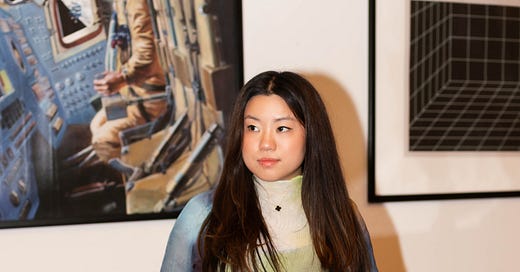



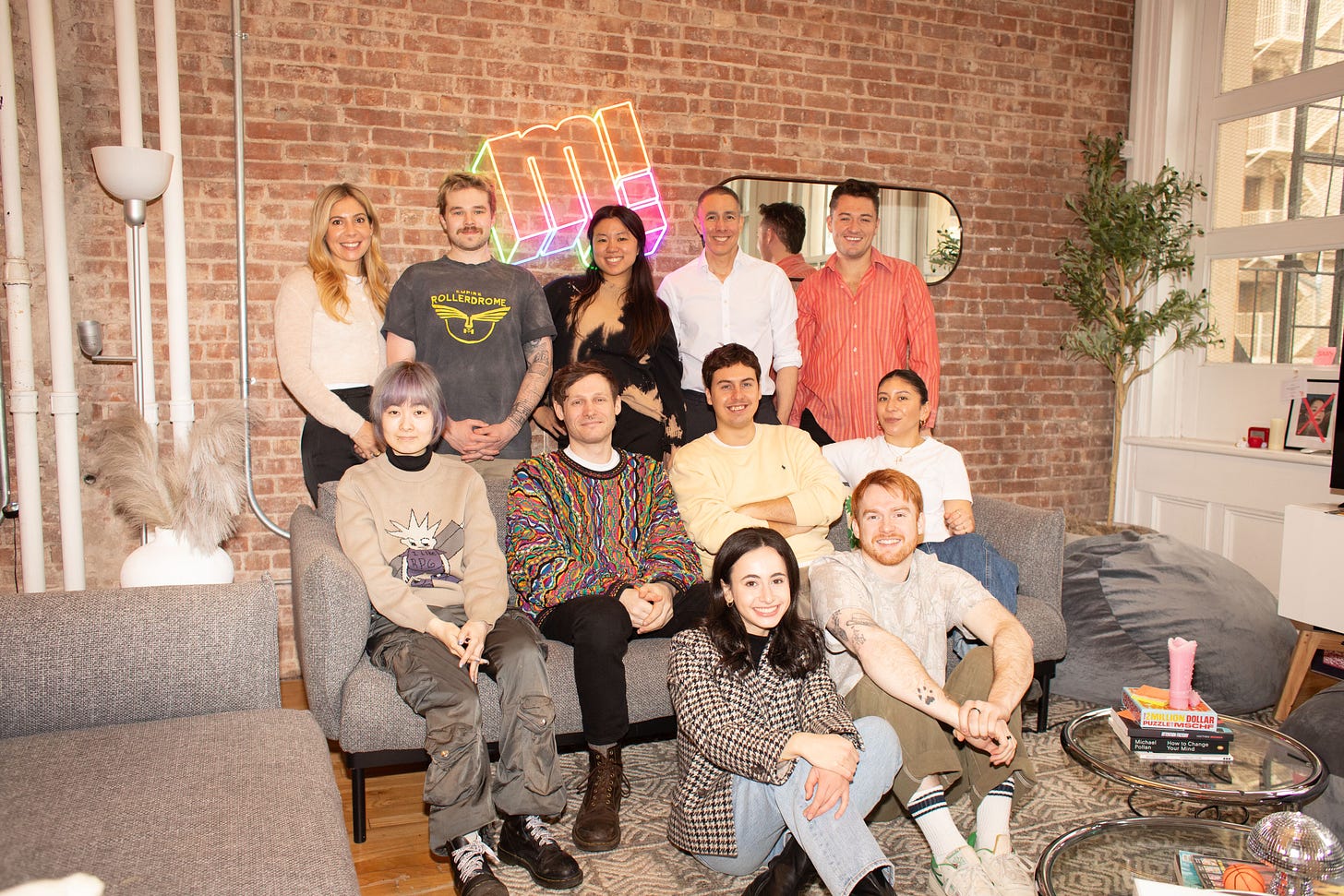
i’m always really curious about the financial side of shortform video ventures like these — where is the bulk of their revenue coming from? certainly not the creator fund; is it partnerships and sponsorships? would be super interested to hear some nitty-gritty practical questions in future interviews!!
Fascinating insights into a world I know nothing about! But I did notice along the way that a lot of older things still hold true (being authentic, showing real emotions etc.). There’s hope for the world!